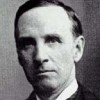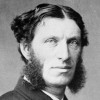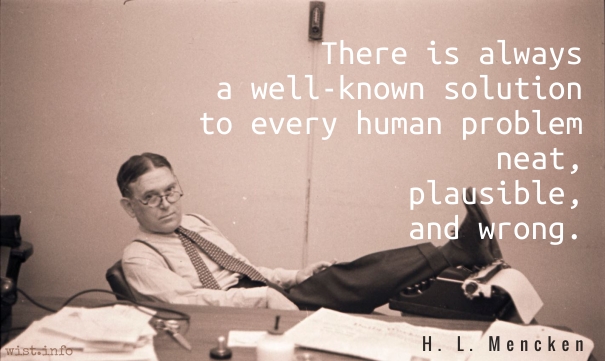Pedantry prides herself on being wrong by rules; while common sense is contented to be right, without them.
Charles Caleb "C. C." Colton (1780-1832) English cleric, writer, aphorist
Lacon: Or, Many Things in Few Words, Vol. 1, § 48 (1820)
(Source)
Quotations about:
common sense
Note not all quotations have been tagged, so Search may find additional quotes on this topic.
Many quite nefarious ideologies pass for common sense. For decades of American history, it was common sense in some quarters for white people to own slaves and for women not to vote. If common sense sometimes preserves the social status quo, and that status quo sometimes treats unjust social hierarchies as natural, it makes good sense on such occasions to find ways of challenging common sense.
Pedantry prides herself on being wrong by rules; while common sense is contented to be right without them.
Charles Caleb "C. C." Colton (1780-1832) English cleric, writer, aphorist
Lacon, #48 (1825)
(Source)
But feeling is so different from knowing. My common sense tells me all you can say, but there are times when common sense has no power over me. Common nonsense takes possession of my soul.
The rule which should guide us in such cases is simple and obvious enough: that the aggregate testimony of our neighbours is subject to the same conditions as the testimony of any one of them. Namely, we have no right to believe a thing true because everybody says so unless there are good grounds for believing that some one person at least has the means of knowing what is true, and is speaking the truth so far as he knows it. However many nations and generations of men are brought into the witness-box, they cannot testify to anything which they do not know. Every man who has accepted the statement from somebody else, without himself testing and verifying it, is out of court; his word is worth nothing at all. And when we get back at last to the true birth and beginning of the statement, two serious questions must be disposed of in regard to him who first made it: was he mistaken in thinking that he knew about this matter, or was he lying?
William Kingdon Clifford (1845-1879) English mathematician and philosopher
“The Ethics of Belief,” Part 2 “The Weight of Authority,” Contemporary Review (Jan 1877)
(Source)
The essence of aphorism is the compression of a mass of thought and observation into a single saying. It is the very opposite of dissertation and declamation; its distinction is not so much ingenuity, as good sense brought to a point.
John Morley (1838-1923) English statesman, journalist, writer [John, Viscount Morley]
“Aphorisms,” speech, Edinburgh (1887)
(Source)
It is safe to wager that every public idea and every accepted convention is sheer foolishness, because it has suited the majority.
[Il y a à parier que toute idée publique, toute convention reçue, est une sottise, car elle a convenu au plus grand nombre.]
Nicolas Chamfort (1741-1794) French writer, epigrammist (b. Nicolas-Sébastien Roch)
Products of Perfected Civilization [Produits de la Civilisation Perfectionée], Part 1 “Maxims and Thoughts [Maximes et Pensées],” ch. 2, ¶ 130 (1795) [tr. Mathers (1926)]
(Source)
(Source (French)). Alternate translations:
It may be argued that every public idea, every accepted convention, is a piece of stupidity, for has it not commended itself to the greatest number?
[tr. Hutchinson (1902), "The Cynic's Breviary"]
One can be certain that every generally held idea, every received notion, will be an idiocy, because it has been able to appeal to a majority.
[In Botton, Status Anxiety (2004)]
It is likely that every public idea, every received convention, is folly, because the majority of men consented to it.
[Source]
Popular reason does not always know how to act right, nor does it always act right when it knows.
Fisher Ames (1758-1808) American politician, orator
“No Revolutionist,” The Palladium (Nov 1801)
(Source)
The freethinking of one age is the common sense of the next.
In the manner of one who has just beheld a two-headed calf they repeated that they had “never heard such funny ideas!” They were staggered to learn that a real tangible person, living in Minnesota, and married to their own flesh-and-blood relation, could apparently believe that divorce may not always be immoral; that illegitimate children do not bear any special and guaranteed form of curse; that there are ethical authorities outside of the Hebrew Bible; that men have drunk wine yet not died in the gutter; that the capitalistic system of distribution and the Baptist wedding-ceremony were not known in the Garden of Eden; that mushrooms are as edible as corn-beef hash; that the word “dude” is no longer frequently used; that there are Ministers of the Gospel who accept evolution; that some persons of apparent intelligence and business ability do not always vote the Republican ticket straight; that it is not a universal custom to wear scratchy flannels next the skin in winter; that a violin is not inherently more immoral than a chapel organ; that some poets do not have long hair; and that Jews are not always pedlers or pants-makers.
“Where does she get all them the’ries?” marveled Uncle Whittier Small; while Aunt Bessie inquired, “Do you suppose there’s many folks got notions like hers? My! If there are,” and her tone settled the fact that there were not, “I just don’t know what the world’s coming to!”
Everybody gets so much information all day long that they lose their common sense.
Gertrude Stein (1874-1946) American expatriate author, feminist
“Reflection on the Atomic Bomb” (1946), Yale Poetry Review (Dec 1947)
(Source)
To spell out the obvious is often to call it into question.
Eric Hoffer (1902-1983) American writer, philosopher, longshoreman
The Passionate State of Mind, Aphorism 220 (1955)
(Source)
The firmness with which the people have withstood the late abuses of the press, the discernment they have manifested between truth and falsehood, show that they may safely be trusted to hear everything true and false, and to form a correct judgment between them. As little is it necessary to impose on their senses, or dazzle their minds by pomp, splendor, or forms. Instead of this artificial, how much surer is that real respect, which results from the use of their reason, and the habit of bringing everything to the test of common sense.
Thomas Jefferson (1743-1826) American political philosopher, polymath, statesman, US President (1801-09)
Letter to John Tyler (28 Jun 1804)
(Source)
Good sense is of all things in the world the most equally distributed, for everybody thinks he is so well supplied with it, that even those most difficult to please in all other matters never desire more of it than they already possess.
[Le bon sens est la chose du monde la mieux partagée; car chacun pense en être si bien pourvu, que ceux même qui sont les plus difficiles à contenter en toute autre chose n’ont point coutume d’en désirer plus qu’ils en ont.]
René Descartes (1596-1650) French philosopher, mathematician
Discourse on Method [Discours de la méthode], Part 1, Opening Words (1637) [tr. Haldane & Ross (1911)]
(Source)
(Source (French)). Alternate translations:
Right understanding is the most equally divided thing in the World; for every one beleevs himself so well stor’d with it, that even those who in all other things are the hardest to be pleas’d, seldom desire more of it then they have.
[Newcombe ed. (1649)]
Good sense is, of all things among men, the most equally distributed; for every one thinks himself so abundantly provided with it, that those even who are the most difficult to satisfy in everything else, do not usually desire a larger measure of this quality than they already possess.
[tr. Veitch (1850)]
Good sense is the most fairly distributed thing in the world; for everyone thinks himself so well supplied with it, that even those who are hardest ot satisfy in every other way do not usually desire more of it than they already have.
[tr. Ascombe & Geach (1971)]
Good sense is the best distributed thing in the world: for everyone thinks himself so well endowed with it that even those who are hardest to please in everything else do not usually desire more of it than they possess.
[tr. Cottingham, Stoothoff (1985), sec. 1]
Common sense is the best distributed commodity in the world, for every man is convinced that he is well supplied with it.
[Oxford Reference]
Of all things, good sense is the most fairly distributed: everyone thinks he is so well supplied with it that even those who are the hardest to satisfy in every other respect never desire more of it than they already have.
Nothing is more fairly distributed than common sense: no one thinks he needs more of it than he already has.
Explanations exist; they have existed for all time; there is always a well-known solution to every human problem — neat, plausible, and wrong.
H. L. Mencken (1880-1956) American writer and journalist [Henry Lewis Mencken]
“The Divine Afflatus,” New York Evening Mail (16 Nov 1917)
(Source)
Reprinted in Prejudices: Second Series (1920) and A Mencken Chrestomathy, ch. 25 (1949).
Variants:
- "There is always an easy solution to every human problem -- neat, plausible, and wrong."
- "For every complex problem, there is a solution that is simple, neat, and wrong."
Common sense is the collection of prejudices acquired by age eighteen.
Albert Einstein (1879-1955) German-American physicist
(Spurious)
Not found in Einstein's writings. There is no evidence of Einstein saying or writing anything like this. It's deemed probably not an Einstein quotation by Einstein scholar Alice Calaprice, The Expanded Quotable Einstein (2000).
Variants:
As Einstein has pointed out, common sense is actually nothing more than a deposit of prejudices laid down in the mind prior to the age of eighteen.
[Lincoln Barnett, "The Universe and Dr. Einstein, Part 2," Harper's Magazine (May 1948), reprinted in The Universe and Dr. Einstein (1950); Einstein wrote the foreword to the book.]
Common sense is that layer of prejudices which we acquire before we are sixteen.
[E. T. Bell, Mathematics, Queen and Servant of the Sciences (1951)]
More discussion of this quotation: Common Sense Is Nothing More Than a Deposit of Prejudices Laid Down in the Mind Before Age Eighteen – Quote Investigator.


















